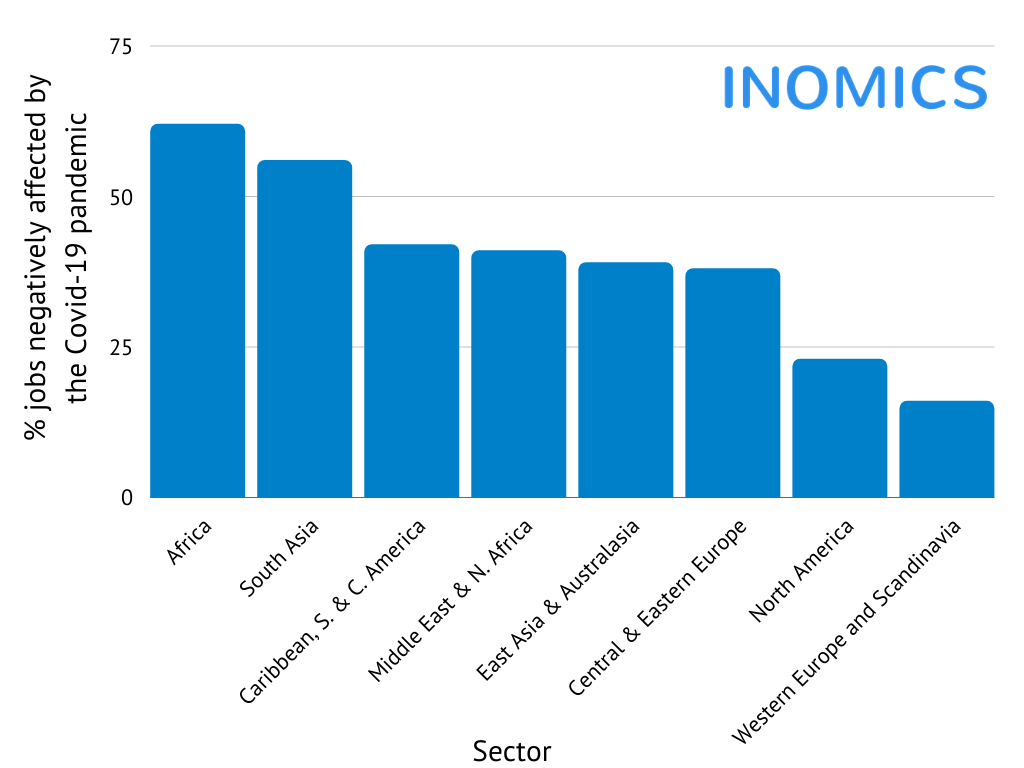
INOMICS Salary Report 2020
How COVID-19 has Affected Economists in the Global North and South
Read a summary using the INOMICS AI tool
The damage wrought by COVID, far from equalising, has been pointedly prejudiced. While the virus itself may struggle to differentiate between people, the world in which it operates has no such problem. Indeed, its structures have ensured COVID’s disruption of employment has fallen unevenly across regions - the experience of economists a case in point. Data from the forthcoming INOMICS’ Salary Report speaks to this directly, revealing the relationship between where one works - specifically in which country - and the level of vocational dislocation.
Overall, 36% of economists reported having been negatively affected by COVID professionally (excluding the turn to home-office), with 6% made redundant. Although this may be similar to comparable sectors, mapped geographically, the numbers tell another - depressingly familiar - story. Simply put, economists working in the Global South have suffered far higher levels of job loss, greater reductions in hours and salary, and have had more promotions postponed, than their Global North counterparts.
The data is stark: 62% of economists in Africa, 56% in South Asia, and 42% in Caribbean, South & Central America, reported being negatively affected by the pandemic professionally, compared with just 23% in North America, and only 16% in Western Europe.
 Global inequality
Global inequality
The International Labour Organisation’s (ILO) report ‘COVID-19 and the world of work’ makes it possible to place these figures among global labour market trends, and, thus, better understand the nuances of the economists’ experience. ILO research uses ‘working-hour losses’ as an aggregate indicator of COVID-19’s impact on the global labour market, and encompasses shorter hours, being employed but not working, being unemployed, and withdrawal from the labour force.
With respect to the Global North/South divide, ILO data contains notable parallels to INOMICS’ survey, reporting that ‘lower-middle-income countries have been hardest hit’ and have endured ‘an estimated decline in working hours of 23.3% in the second quarter of the year’- the equivalent of 240 million full time jobs. This trend continued throughout the third quarter and is accounted for by greater prevalence of informal work, limited opportunities for teleworking, and general resource constraints. Unfortunately, because of unevenly distributed fiscal stimuli, its consequences are also set to worsen - the report expressing concern that ‘the estimated stimulus gap for low-income countries is less than 1% of the total value of the fiscal stimulus packages announced by high-income countries’.
A diverging economic experience
Where our results and the ILO’s report diverge, however, is among the regions in which employment disruption is at its most severe. For economists that is Africa and South Asia. But this bucks the global labour trend which has seen workers in Latin American and Caribbean countries worst affected, the region losing a full quarter of all working hours in the third quarter. In Central America alone, hours lost reached 30%. Moreover, ILO data reports that African continent sustained an 11.5% working hours loss in the third quarter, 3.5% more than Western Europe, and just 0.7% more than Northern Europe. Given that almost two thirds of economists in Africa reported being negatively affected by COVID, it would appear they are among the more disproportionally hit of the continent’s professions.
Everything, though, remains in flux, making comprehensive analysis of COVID’s ongoing effect on the labour market a difficult process. With that said, INOMICS’ data, placed among that of the ILO, offers a glimpse of the regional discrepancy which underpins the economist’s experience, a discrepancy that, while fitting with larger trends, diverges in where job disruption is at its highest. It’s one that, here at INOMICS, we will continue to track.
-
- Postdoc Job
- Posted 1 week ago
Postdoctoral Researcher (all genders welcome)
At Georg-August-Universität Göttingen in Germany -
- Postdoc Job
- Posted 5 days ago
6-Year Postdoc with Option for a PermanentContract (f/m/d, 100%)
At ZEW – Leibniz-Zentrum für Europäische Wirtschaftsforschung GmbH Mannheim in Mannheim, Germany
-
- Researcher / Analyst Job
- Posted 1 day ago
Economic Analyst – Corporate Tax Modeller
At Joint Research Centre of the European Commission in Sevilla, Spain















